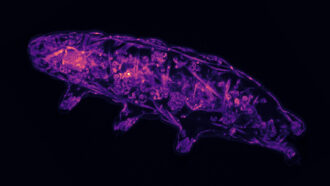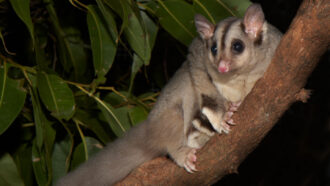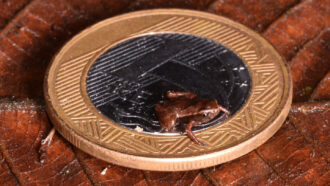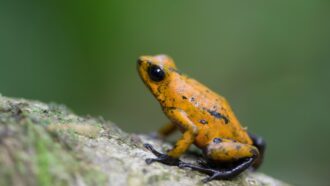An elephant’s “aha!” moment
A young elephant named Kandula passes a tricky test
Kandula is a young Asian elephant that lives at the Smithsonian’s National Zoological Park in Washington, D.C. He’s a clever pachyderm. Scientists recently watched Kandula solve a problem in a way never before seen in elephants.
This test may have looked unusual. Scientists attached pieces of fruit to a branch and then hung the branch out of reach of the elephant’s trunk. Unlike other elephants, this didn’t stop Kandula: He used his trunk to roll a plastic box so that it sat underneath the branch. He then stood on the box, lifted his trunk and easily pulled down the branch. And ate the treat.
Elephants are smart. They have magnificent memories, they recognize themselves in mirrors and they can use simple tools. Until recently, scientists didn’t know if the giant animals also could come up with a solution to a problem on the spot, called using insight. You use insight when you study a difficult puzzle for a while, leave to do something else and then suddenly see a solution. Insight is the ability to solve a problem in a flash.
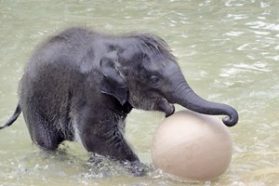
In previous tests, elephants haven’t shown evidence of insight. Foerder was part of a team of scientists who went looking for elephant insight anyway. He designed tricky problems for Kandula and two other elephants at the zoo in Washington.
These elephants usually live in tropical forests, and Foerder told Science News that they regularly solve problems in their lives. The challenge for scientists was distinguishing whether the animals complete tasks by trial and error, by watching other animals or by quickly realizing the solution on their own (insight). The only way to know was to present an elephant with a problem and watch.
“If you’re not there for the first time they do it, you don’t know if it was insight,” Foerder told Science News.
To probe how elephants solve problems, the researcher and his colleagues tested Kandula and two other National Zoo elephants — Kandula’s mother, 33, and a 61-year-old elephant neighbor — in a series of experiments.
First, the scientists placed trays of fruit outside the animals’ enclosure. The food was just out of reach. They also placed some sticks nearby. The elephants tried but failed to get the treat; they never used the sticks to draw the food closer.
They did use the sticks in other ways. “They would beat the wall, they would beat the floor, they would beat their toys,” Foerder told Science News.
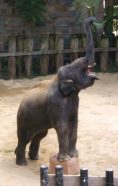
Next, the experiment moved outside. The scientists hung bamboo branches decorated with fruit high overhead. They also provided the elephants with sticks and a plastic box that could serve as a stepping stool. After six tries, Kandula wasn’t able to get the food (though he did reach for it). In the seventh try, Kandula seemed to have been struck by the right idea and used insight to solve the puzzle. Foerder explained that in one smooth motion, the clever elephant rolled the box directly to the branch and stood on the box to get the food.
The other elephants didn’t make the same connection.
Diana Reiss, a psychologist who tries to understand how animals think, also worked on the study. Reiss, who teaches psychology at Hunter College in New York, told Science News that maybe it’s time to think differently about how elephants solve problems. Perhaps their brains do allow them to make easy connections among bits of information.
On the other hand, some scientists say elephants’ brains have different strengths. Benjamin Hart is a veterinary science professor at the University of California, Davis School of Veterinary Medicine. He has studied elephant behavior and he told Science News that elephants’ brains are built for long-lasting memory and social skills, but not so much for connecting the dots among different pieces of information.
POWER WORDS
psychology The scientific study of the mind and its functions. Comparative psychology refers to the study of animal minds.
behavior The way a person or animal acts towards others, or conducts itself.
insight The ability to gain an accurate and deep understanding of a situation just by thinking about it, instead of working out a solution through experimentation.
intelligence The ability to collect and apply knowledge and skills.


